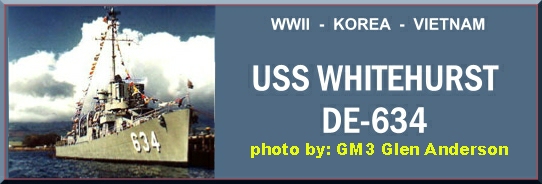
Logo by: Pat Stephens, Webmaster, DESA
|
Memories and Reflections |
|
Art Hammarlund |
|
(Art Hammarlund was the first XO of Whitehurst after recommissioning in 1950. mc) |
|
I received a telephone call from my Grandson, a soldier in the Army stationed in Hawaii, stating that USS Whitehurst web site reported that I died an early death due to stomach troubles. The report is in error. I have a serious case of rheumatoid arthritis. I was aware of reunions of the crew of Whitehurst, but I was not interested as my tour onboard that ship was not happy. When I detached from the ship I weighed 113 pounds. Time has healed some of my feelings. In the afternoon of September 11, 1950, USS Jeffers (DMS27) was completing overhaul at the Charleston Naval Shipyard. The Chief Quartermaster and I were on the bridge as yard tugs maneuvered a shabby DE into a berth at the yard. I remarked to the Chief, "I hope I am never assigned to a ship like that." At 2100 that night my orders were received and by 1400 next day, I reported on board that ship, USS Whitehurst DE 634, as Executive Officer. Within the first half hour onboard, I was advised that there were problems with the leadership provided by the Commanding Officer. A stressful, yearlong assignment began. The ship had been in the reserve fleet at Green Cove Springs, Florida, with her power plant in operation to furnish electrical power to the reserve fleet. She was commissioned in ten working days, which explains some of the initial problems with the ship's operations. Things were so bad that even the ship's bell was broken. The hull so magnetized that the magnetic compass would not swing through a full 360 degree circle. The hull was in very poor condition, having had no maintenance. In Pearl Harbor there was an opportunity to sand blast the hull above the waterline. The underwater part of the hull had been renewed in Norfolk. The sandblasting was an all hands evolution. The ship was shutdown and sealed. The hull and superstructure sandblasted and primed, and the ship moved back to the shipyard. It was a long operation, but the result was a major reduction in the work required to maintain the hull. It was at that time that the cracked, ship's bell was replaced. I was the Executive Officer and Navigator, and stood all 4 to 8 watches at sea. The Captain expected me to be on duty at all times and made no allowances that I was standing eight hours of watch a day. Underway there were no junior officers of the deck as the Captain forbid assigning them to a watch. A junior officer, which the Captain would not allow to stand a JOOD watch, was at the conn entering Pearl Harbor. On the trip between Midway Island and Sasebo, Japan, I became exhausted after the ship passed Kagoshima, Kyoto and collapsed while on watch. I believe the Captain was afraid to con the ship. A pilot was used entering port and mooring. Several times the request for a pilot was made, as the ship approached the harbor entrance, which caused a few hours delay entering port. Only on rare occasions, I was permitted to conn the ship. The Captain did some things to improve the morale of the ship. In Pusan Korea, he obtained wood for the crew to construct a recreation building on the pier adjacent to the ship. The building was constructed of Philippine mahogany, which had been brought to Korea as dunnage. Beer was sold, movies shown, and bingo games were held in the building. He also arranged for the purchase and resale to the crew, of hobby kits, which were sold immediately upon arrival onboard. In the spring, I received orders to the NROTC Unit at Brown University. I looked forward to leaving the ship, but after a few weeks the Captain requested that my orders be canceled. The request was denied. I was then told that I would not be transferred until my relief was onboard. The ship was in Sasebo avoiding a typhoon when my relief reported. I left the ship without regret. I saw Whitehurst several times in later years... I never went back aboard. Posted 26 November 2002. note: 8 August 2014, I received a brief note
from the grandson of An excerpt from the letter:
|
WWII
Era | Korea War &
'50s | Viet Nam & 60s |
Reunions |
All Links Page |
Search & Rescue
Memorial |
Poetry |
Enemy Below |
Taps List |
Photos/Armament |
History |
Crews Index |
Home